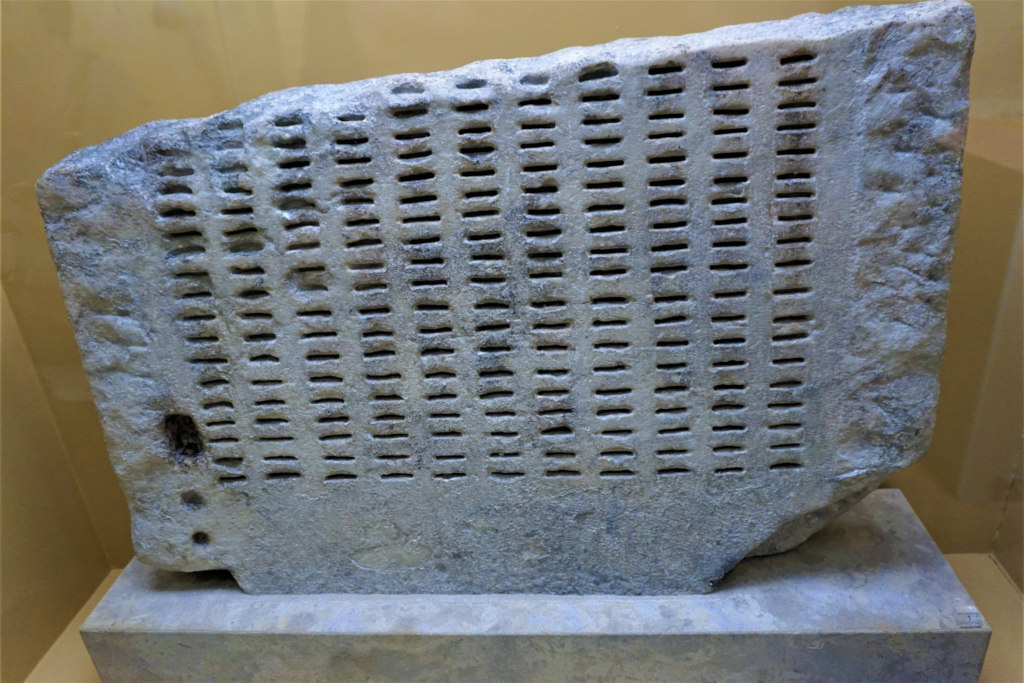

The Ancient Athenian legal system began with the selection of the jury. Only citizens could be members of the jury (which excluded metics, women and slaves), and these citizens had to be over 30. Every year, a number of citizens would volunteer to be jurors and from them, a jury pool of 6,000 men would be chosen by lot, 600 from each tribe. This jury pool would be divided into 10 sections of 600 people, and each man would be given a ticket made of bronze or wood with his name and what section he was in written on it. At dawn, anyone who wanted to be a juror on a particular day would present themselves. These people’s tickets would enter a sorting device called a kleroterion, which would then randomly select the jury for that day’s trial. Juries were usually quite large, and were made up of between 201 and 501 jurors. They were paid 3 obols for their service.
The above video shows the full-time testing of a Kleroterion. You can see that jurors' tickets are placed in the kleroterion, then rows of tickets are separated into non-participation in the jury (if the ball is black) or participation in the jury (if the ball is white). It is recommended to skip through parts of this video and/or watch on a high playback speed.

What were the advantages to this method of choosing a jury?
What were the disadvantages to this method of choosing a jury?
How similar were Ancient Athenian juries to modern juries? Think about both similarities and differences.
Before the trial began, the defendant had to be summoned to court. One person needed to witness the summons, and the alleged offence had to be made clear to the defendant.
Only citizens could bring a case to trial: both women and metics needed a male citizen (in a woman's case, one of her relatives) to bring the case to court on their behalf.
The jurors made an oath to judge the trial according to Athenian laws, then the case began. There were no lawyers: the person accusing (plaintiff) and the person defending themselves (defendant) both had to present their cases by themselves. They could, however, pay speech writers to help them plan what they were going to say, which would help to make them more persuasive to the jury. Both the plaintiff and the defendant had a set amount of time to speak – the amount of time would be determined by the severity of the crime – which was measured using a water clock.
Witnesses could be called to provide evidence, although there was no cross examination. Slaves had to be tortured before giving evidence, because they were thought to be natural liars. The defendant could also call character witnesses. Character witnesses did not provide evidence about the case; they testified that the defendant was a good person. Character witnesses could be paid to support a defendant. They played a very important role, as there were times when even though the defendant was found guilty, a lighter punishment, or perhaps even no punishment at all, was given because the defendant was thought to be a good person.
Unlike in most modern courts, the jury didn’t have to be silent while the defendant and plaintiff were speaking. They could speak their mind, and even hurl abuse at the side they disagreed with. After both sides had rested their case, the jury decided whether the defendant was guilty by putting stones into one of two urns, one representing a not guilty verdict and the other representing a guilty verdict.
If the defendant was found guilty, the defendant and the plaintiff would put forward the punishment they thought was appropriate. The jury had to choose between one of these punishments – they couldn’t choose their own sentence. The jury members scratched a short line into a wax tablet to indicate they thought the shorter sentence was better, and a longer line for the longer sentence.

What do you think the impact might be of not having any legal professionals (e.g. judges and lawyers)?
Do you think character witnesses were a good idea?
What advantages can you think of about the legal system?
What disadvantages can you think of about the legal system?
How similar was the Ancient Athenian legal system to the modern legal system? Think about both similarities and differences.
The major strength of the legal system was that all citizens were equal before the law, and all citizens had the chance to obtain justice. Decisions were made by the people, not by a few powerful figures.
Another strength of the legal system was that the jury was chosen by lot, which meant every citizen could take part as long as they were over 30, no matter their popularity or level of education. It also meant the system was less corrupt, because it was impossible to bribe a random process (the kleroterion) in order to get a jury that was sympathetic to your case. The fact that there were a very large number of jury members also led to less corruption, because it would be hard to bribe so many people.
Young citizens under the age of 30 couldn’t participate in the jury, which could be seen as undemocratic because the interests of the young weren’t represented.
Because jury members were chosen by lot they often didn’t have any knowledge of the law. Rather than the law, the jury often based their opinion on emotions. It was unfair that the same person could be judged differently depending on the mood of the jury.
Because the jury didn’t have knowledge of the law, precedents weren’t observed (cases weren’t judged in the same way as similar cases had been in the past). This made the legal system erratic because there was no consistency in the judgements made.
The jury were paid for service, so even the poorest could afford to participate. This was highly democratic. However, the fact that there was an economic incentive to participate may have attracted people who were uninterested in obtaining justice, and just wanted to collect their payment. These people would spend the minimum time and effort on the case, so would be less likely to reach a fair decision.
It was fair that both the prosecutor and the defendant got the same amount of time to make their cases, as it ensured that both had equal opportunity to persuade the jury that they were right.
The fact that there were no legal professionals (such as lawyers or judges who made money out of the legal system) could be argued as a strength of the legal system. There was no member of the intellectual and financial elite ruling over the court as a modern judge does. The court was ruled over by the people, the jury. Rich defendants and prosecutors couldn’t get an advantage over poor defendants and prosecutors by hiring an expensive lawyer – every person had to make their own case. However, the fact that there were no legal professionals also meant that there was no one in the court with an in depth understanding of the law. This contributed to the lack of consistency in the punishment of crimes, and meant sentencing was often based more on the emotions of the jury than any law.
Although the rich couldn’t get an advantage by hiring an expensive lawyer, they could get an advantage by hiring an expensive speech writer to write them a very persuasive argument. This gave the rich an advantage over the poor, which is unfair. It could also be argued that allowing character witnesses was unfair, because the punishment a person gets should be based on what they did, not the type of person they are.
Of course, one weakness of the legal system was that women, metics and slaves couldn’t be part of it. Furthermore, slaves had to be tortured in order to give evidence, and torture is both immoral and has been shown to be a bad way to get accurate and honest information. When Athens became leader of the Delian League, any other poleis in the Delian League had to travel to Athens in order to bring a case to court – this was very expensive and often impossible for many people.
Another weakness was that after a person was found guilty, the jury couldn’t choose their own punishment. Instead, they had to choose between the punishment put forward by the defendant and the one put forward by the plaintiff. This greatly restricted the options of the jury, which often meant a criminal didn’t get a fair punishment. For example, when the plaintiff and the defendant both chose extreme options, the jury couldn’t choose a middle ground and could only give a very severe or very lenient punishment. This was the case during Socrates’s trial. Socrates was a famous philosopher who thought that the only thing he knew was that he knew nothing. He thought that everyone else knew nothing as well, and went around Athens questioning other citizens’ beliefs and breaking them down until they realised that they didn’t know what they thought they knew. This process of asking questions in order to achieve philosophical truth is known as the Socratic method. The people of Athens became angry at Socrates for continuously challenging their beliefs, and decided to try him for misleading the Athenian youth and not believing in the gods. The jury found him guilty, and it came time for both sides to put forward their suggestions for the punishment. The plaintiff said that Socrates had to be put to death, but Socrates argued that he didn’t want to be exiled or imprisoned, so the only other option was a fine. However, he didn’t have any money, so he proposed that he should pay a very small fine, the money for which his friends would probably be able to raise. The jury likely thought that death was quite a harsh punishment, but also couldn’t let Socrates off with such a small and insignificant punishment, so had no choice but to put Socrates to death.
However, Socrates' situation was fairly unusual. Most of the time both the defendant and plaintiff chose to suggest similar punishments, since if they suggested a punishment that was extremely harsh or extremely light, the jury was likely to choose the punishment proposed by their opponent (as happened during Socrates’s trial). This meant that when a criminal did merit a particularly harsh or particularly lenient punishment, they wouldn’t get this and justice wouldn’t be served.
Do you think it was a good idea that the jury was chosen by lot?
Should the jury have been paid for service?
Overall, do you think it was a good idea that there were no legal professionals?
Were there more strengths or more weaknesses to the Ancient Athenian legal system?
Overall, do you think the Athenian legal system was fair?